The majority of the world’s goods transports takes place through shipping. Maritime transport is by its very nature international and maritime law – the regulatory framework governing shipping – is to a significant extent based on international conventions. Issues often relate to the interaction of different regulatory frameworks, and the legal issues that arise tend to be complex.
The maritime law rules have several functions, one of the most central being to allocate liability among different actors in conjunction with a maritime transport. Since the liability rules to a large extent are mandatory and cannot be contractually excluded, as an actor within the industry you should be aware of what applies in a certain situation depending on the capacity in which you act. This applies in particular if you are a shipowner, shipper or cargo owner, but can also be relevant if you act in the capacity of a bank, insurance company or other type of supplier in the transport chain.
Different maritime law rules may also be central to other issues relating to ships, but not the transport contract. These may include issues concerning liability in the event of collisions and other damage caused by ships, ship transactions (purchase and sale of ships), financing of ships, maritime support, tonnage tax and issues of compliance with safety and environmental regulations, such as SOLAS.
The carrier’s liability for cargo damage does not always provide full protection for companies transporting high value goods. The carrier’s right to limit its liability in damages for damage to the goods and the relatively short period of time within which a claim must be submitted are important to be aware of in order not to forfeit the right to compensation. It requires knowledge and experience to ensure the protection of rights in connection with the transport of goods, for both the carrier and the purchaser of transports.

Our lawyers are experts in maritime law and international maritime transport and the application thereof. We help carriers as well as purchasers of transport as well as other third parties in the transport chain in order to protect their rights, which includes the entire spectrum from entering into transport contracts to situations whereby goods are lost or damaged during a maritime transport, or in the event of delays in the delivery of goods. We also provide assistance and advice for both shippers and shipowners in connection with chartering of ships. We also help to safeguard the rights of both customers and carriers in relation with public authorities in conjunction with maritime transports.
Maritime transports, in particular international and multimodal, require advice covering specialist competences within other types of transport (air transports, road transports and rail transports).
In addition, the execution and purchase of maritime transport often go hand in hand with other strategic advice where we work closely with other specialist competences within insurance law, commercial agreements, labour law and international trade.
We are the country’s largest actors in the field of full‑service business law and transport law. Our law firm can provide broad knowledge and bespoke advice within several legal areas. We help companies within all industries.
If you want to know more about our law firm or our other practice areas, you can find more information here. >